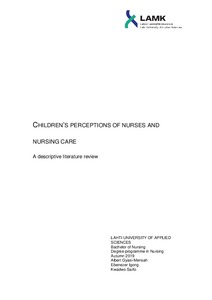Artificial intelligence in nursing education : a descriptive literature review of the evidence
Nassef, Elsaid; Zeid, Israa Abou (2024)
Nassef, Elsaid
Zeid, Israa Abou
2024
All rights reserved. This publication is copyrighted. You may download, display and print it for Your own personal use. Commercial use is prohibited.
Julkaisun pysyvä osoite on
https://urn.fi/URN:NBN:fi:amk-2024050810012
https://urn.fi/URN:NBN:fi:amk-2024050810012
Tiivistelmä
In the evolving landscape of nursing education, the integration of artificial Intelligence (AI) stands as a transformative force, yet literature addressing its implications, particularly in the Finnish context, remains limited. This thesis endeavors to fill this gap by conducting a descriptive literature review aimed at elucidating the role of AI in nursing education, examining its implications, and informing strategies for effective integration into curricula.The purpose of the thesis is to explore innovative ideas using artificial intelligence in nursing education. The aim of the study intends to further the conversation on artificial intelligence in nursing education while also benefit Centria University of Applied Science's nursing programs, instructors, and students.
Using a descriptive literature review technique, this study investigate the body of research on artificial intelligence's use in nursing education using a descriptive literature review, which examines previously published research data, was used to complete this thesis. In data collection, four databases were used: CINAHL, SCIENCE DIRECT, PUBMED, and MEDLINE. 13 articles were selected for content analysis from these databases. In order to gather data, extensive searches were performed using terms like artificial intelligence, virtual reality, nursing, nursing education, and AI technologies across global databases. Relevant research articles that meet the requirements for inclusion criteria were reviewed, analyzed and summarized to find utilization patterns of AI in nursing education, advantages and gaps in the literature.
Findings indicate that artificial Intelligence (AI) technology, such as virtual assistants, extended reality, chatbots, and virtual reality simulations provide a potential path to improve nursing education outcomes, such as students' enhanced performance, improve clinical competency for complex nursing procedures, and enhance critical thinking abilities. Despite the possible advantages, ethical issues including privacy concerns and academic integrity demand that AI be carefully integrated and supervised in educational contexts. The study also emphasizes the need for continued investigation into the efficacy and significance of AI in nursing education, with a focus on closing implementation gaps and guaranteeing ethical norms. Investing in nursing educator training, and creating extensive instructional programs that strike a balance between traditional educational methods and AI technology innovations with alignment to the best practices in pedagogy. In summary, incorporating AI into nursing education has the potential to significantly alter the way that learning occurs and better equip future nurses to meet the demands of modern healthcare settings. However, to optimize AI's advantages while reducing its possible drawbacks, close attention to educational, practical, and ethical issues is essential.
Using a descriptive literature review technique, this study investigate the body of research on artificial intelligence's use in nursing education using a descriptive literature review, which examines previously published research data, was used to complete this thesis. In data collection, four databases were used: CINAHL, SCIENCE DIRECT, PUBMED, and MEDLINE. 13 articles were selected for content analysis from these databases. In order to gather data, extensive searches were performed using terms like artificial intelligence, virtual reality, nursing, nursing education, and AI technologies across global databases. Relevant research articles that meet the requirements for inclusion criteria were reviewed, analyzed and summarized to find utilization patterns of AI in nursing education, advantages and gaps in the literature.
Findings indicate that artificial Intelligence (AI) technology, such as virtual assistants, extended reality, chatbots, and virtual reality simulations provide a potential path to improve nursing education outcomes, such as students' enhanced performance, improve clinical competency for complex nursing procedures, and enhance critical thinking abilities. Despite the possible advantages, ethical issues including privacy concerns and academic integrity demand that AI be carefully integrated and supervised in educational contexts. The study also emphasizes the need for continued investigation into the efficacy and significance of AI in nursing education, with a focus on closing implementation gaps and guaranteeing ethical norms. Investing in nursing educator training, and creating extensive instructional programs that strike a balance between traditional educational methods and AI technology innovations with alignment to the best practices in pedagogy. In summary, incorporating AI into nursing education has the potential to significantly alter the way that learning occurs and better equip future nurses to meet the demands of modern healthcare settings. However, to optimize AI's advantages while reducing its possible drawbacks, close attention to educational, practical, and ethical issues is essential.
Kokoelmat
Samankaltainen aineisto
Näytetään aineisto, joilla on samankaltaisia nimekkeitä, tekijöitä tai asiasanoja.
-
Virtual Reality and its use in surgical nursing training : a literature review into the effectiveness of Virtual Reality as a new practical educational method for training Registered Nurses in surgical nursing
Jokinen, Felipe Ignacio (2021)The general purpose of this thesis was to review the literature available to Virtual Reality to ascertain if the technology has a possibility to augment or become a more effective way to train Registered Nurse students in ... -
Cultural Diversity in Finnish Health Care: A COMPARISON OF NURSE MANAGERS, NATIVE-FINNISH REGISTERED NURSES, AND IMMIGRANT REGISTERED NURSES PERSPECTIVES AND EXPERIENCES OF CULTURAL DIVERSITY IN THE FINNISH HEALTHCARE WORK ENVIRONMENT
Atanga, Josephine; Mwangi, Caroline; Ghimire, Dibya (2022)Background: There is a global scarcity of healthcare workers, particularly in Western countries such as Finland resulting in a greater reliance on foreign-trained professionals to fill the gap in the nursing workforce. ...Rajoitettu käyttöoikeus / Restricted access / Tillgången begränsad -
Children's perceptions of nurses and nursing care : A descriptive literature review
Gyasi-Mensah, Albert; Sarfo, Kwadwo; Igong, Ebenezer (2019)Hospitalization can be a very stressful and traumatic experience for children. Children have a limited understanding of procedures and hospital environment. Thus, it is even more important for health care professionals to ...


